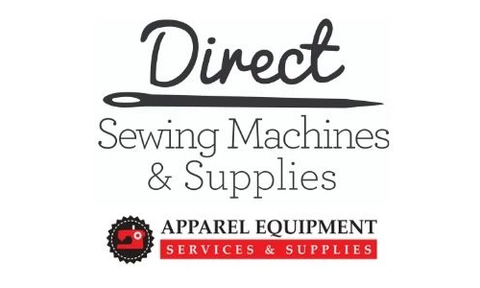The Complete Guide to Sewing Machine Needles in NZ

When it comes to sewing, the needle is one of the smallest parts of your machine — but it makes the biggest difference. Choosing the wrong needle (or using a blunt one) is one of the top causes of broken stitches, skipped stitches, puckered fabric, or even machine damage.
In this guide we’ll cover everything you need to know about sewing machine needles: types, sizes, when to use them, and how to pick the right one for your project. We’ll also answer the most common needle questions New Zealand sewists ask.
Understanding Needle Sizes
You’ll often see sewing machine needles labelled with two numbers — for example 80/12 or 90/14.
-
The European size (first number) refers to the needle shaft diameter in hundredths of a millimetre. For example, size 80 = 0.8mm.
-
The American size (second number) is a more general scale.
Here’s a quick reference:
-
70/10 – fine lightweight fabrics (silk, voile, fine cottons)
-
80/12 – medium fabrics (quilting cotton, poplin, polyester blends)
-
90/14 – slightly heavier fabrics (linen, denim shirts, corduroy)
-
100/16 – heavy fabrics (canvas, upholstery, denim jeans)
-
110/18 – very heavy fabrics (multiple denim layers, leather, vinyl)
Needle Types and When to Use Them
Universal Needles

Good all-rounders for most woven and stable fabrics. Ideal for beginners.
Shop Universal Needles
Sharp / Microtex Needles

-
Designed with a very fine, sharp point.
-
Perfect for tightly woven fabrics like silk, taffeta, microfibre, and coated fabrics.
-
Gives crisp, precise stitching.
Shop Schmetz Microtex Needles
Ballpoint Needles

-
Rounded tip pushes between fibres instead of piercing them.
-
Best for knitted fabrics (jersey, interlock, rib knits).
-
Prevents runs or holes in stretch fabric.
Shop Ballpoint Needles
Stretch Needles

-
Similar to ballpoint, but specially designed for high-stretch fabrics like Lycra, spandex, swimwear fabric.
-
Helps prevent skipped stitches.
Shop Stretch Needles
Jeans / Denim Needles

-
Reinforced shaft and sharper tip.
-
Handles thick, tightly woven fabrics like denim, canvas, heavy twill.
-
Use sizes 90/14 and above.
Shop Jeans/Denim Needles
Leather Needles

-
Wedge-shaped point cuts cleanly through non-woven materials like genuine leather, suede, vinyl.
-
Not suitable for woven fabrics.
Shop Leather Needles
Embroidery Needles

-
Larger eye to accommodate embroidery thread.
-
Designed to reduce shredding or breakage of specialty threads.
Shop Embroidery Needles
Twin Needles

-
Two needles on a single shaft for parallel stitching.
-
Great for hems on knitwear (a “coverstitch look” without a coverseamer).
Shop Twin Needles
Choosing Needle Brands
At Direct Sewing Machines we stock the world’s most reliable brands:
-
Schmetz Needles – a trusted favourite worldwide. Huge variety of types and sizes.
-
Groz-Beckert Needles – German-engineered precision, especially popular for industrial machines.
-
Janome Needles – designed to pair perfectly with Janome domestic machines.
-
Singer Needles – long-standing, affordable needle options for Singer and other brands.
No matter your machine, we’ll have the right fit.
How Often Should You Change Your Needle?
-
After every 6–8 hours of sewing.
-
At the start of every new project.
-
Immediately if you notice skipped stitches, uneven tension, or a popping sound.
A blunt needle can damage your fabric and stress your machine.
FAQs About Sewing Machine Needles
Q: Can I use any brand of needle in my sewing machine?
Yes, most modern domestic machines use the same “130/705 H” needle system. Schmetz, Groz-Beckert, Janome, and Singer needles will fit unless your machine specifies otherwise.
Q: What’s the difference between a sharp and a ballpoint needle?
Sharps pierce the fibres — best for tightly woven fabrics. Ballpoints slide between fibres — best for knits.
Q: How do I know if my needle is blunt?
If you hear a popping sound, see skipped stitches, or the needle struggles to penetrate fabric, it’s time to change.
Q: Can one needle sew all fabrics?
Not really — a universal needle can handle many, but specialised fabrics (denim, leather, stretch) perform much better with the correct needle.
Q: Do industrial machines use the same needles?
No — industrial machines often use different systems. Groz-Beckert is the go-to brand for most industrial setups.
Final Tips
The right needle makes sewing smoother, prevents machine issues, and gives your projects a professional finish. Don’t risk hours of sewing on the wrong needle — it’s always worth matching the needle to the fabric and project.
Explore our full range of Schmetz, Groz-Beckert, Janome, and Singer sewing machine needles at Direct Sewing Machines.



